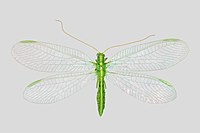
Photo from wikipedia
The development and fecundity of the predator Chrysoperla carnea Stephens (Neuroptera: Chrysopidae) were assessed by feeding Aphis gossypii Glover (Hemiptera: Aphididae) that had been reared on transgenic Bacillus thuringiensis (Bt)… Click to show full abstract
The development and fecundity of the predator Chrysoperla carnea Stephens (Neuroptera: Chrysopidae) were assessed by feeding Aphis gossypii Glover (Hemiptera: Aphididae) that had been reared on transgenic Bacillus thuringiensis (Bt) cotton SGK321 and a non-Bt cotton control (SY321) for two successive generations. We found no significant differences in the developmental stage duration, stage survival, or egg hatch rate between C. carnea fed A. gossypii reared on the Bt and non-Bt cotton. The fecundity per female over a 25-day observation period was very similar between treatments; for C. carnea fed A. gossypii reared on SGK321 vs. SY321, the amount of eggs laid was not significantly different in both generations. Furthermore, a population dynamics of A. gossypii and lacewing (mainly C. carnea) were highly similar in the SGK321 and SY321 treatments during 2016–2017. These results suggest that Bt cotton does not have a significantly negative or positive effect on C. carnea in terms of development, survival, fecundity, or population dynamics.
Journal Title: PLoS ONE
Year Published: 2019
Link to full text (if available)
Share on Social Media: Sign Up to like & get
recommendations!